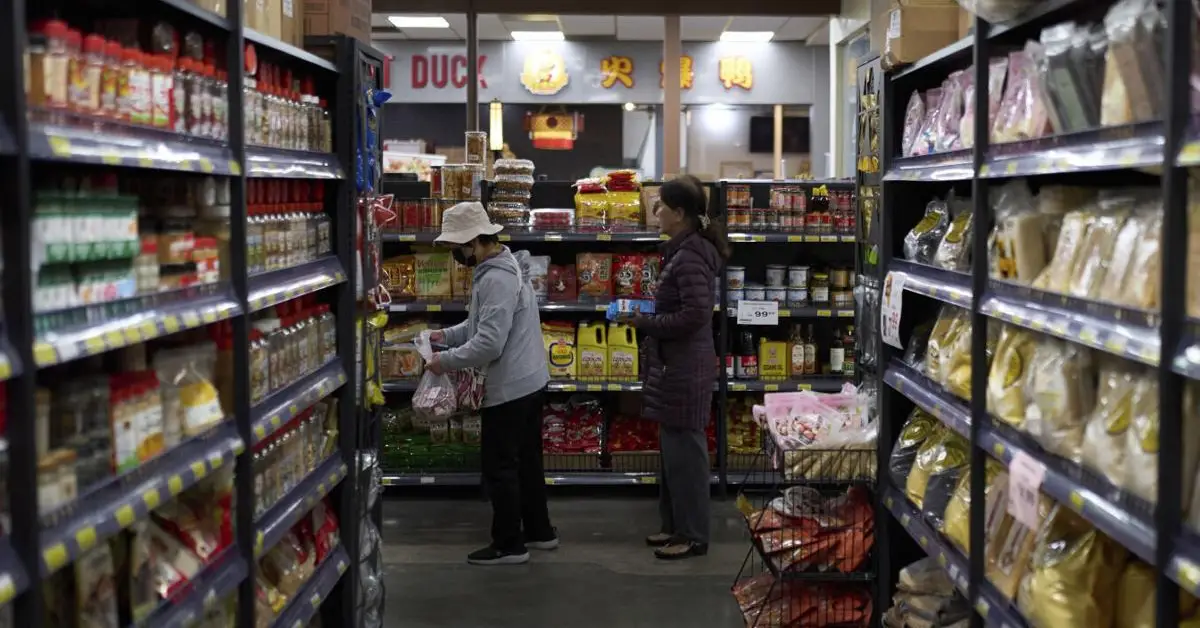In New Jersey, businesses are increasingly adding “tariff surcharges” to their products and services as they face rising import taxes on goods from China. From local wedding boutiques to third-party sellers on Amazon, many companies are passing the cost of these tariffs onto consumers.
The trend is becoming more common as companies in various sectors adjust to the financial strain caused by U.S. tariffs on Chinese imports. In Cherry Hill, New Jersey, Jan’s Boutique, a local wedding shop, is feeling the pressure.
Co-owner Paul Virilli explained to CBS News that gown prices have been steadily rising as tariffs on Chinese imports climb. Virilli said, “We hope China and the U.S. relationship gets fixed,” noting that the majority of their dresses come from China and Vietnam.
These rising costs aren’t limited to just local businesses. At Dame, a company run by CEO Alexandra Fine, a $5 “Trump Tariff Surcharge” has been added to all orders. Fine told The Wall Street Journal that this surcharge is about offering more transparency to customers. “We want people to understand why the prices are going up,” she said. The move to add a surcharge is a direct response to the increased cost of goods from overseas, primarily China.
The trade war between the U.S. and China has led to a series of tariffs on imports, raising the cost of materials and finished goods from China. As these tariffs increase, American manufacturers and retailers have been forced to adjust their pricing strategies. Many businesses are now opting to pass these additional costs onto consumers, either through price hikes or, as we’re seeing more frequently, through these added surcharges.
Amazon, the world’s largest online retailer, is also feeling the impact of these tariffs. CEO Andy Jassy spoke with CNBC, explaining that manufacturers can no longer absorb the added costs. As a result, they will pass those costs along to customers. “It’s something we’ve had to do,” Jassy said. “It’s just the reality of the situation.” For consumers, this means higher prices across a range of products, from electronics to clothing.
This shift to add surcharge fees has sparked mixed reactions among consumers. While some shoppers understand the need for businesses to adjust to changing economic conditions, others are frustrated by the rising prices. The tariffs affect a wide variety of goods, and the price hikes aren’t limited to just high-end products. Everyday items like home goods, clothing, and even food could be subject to these added surcharges.
The idea behind the surcharge is to maintain transparency with customers, but it also highlights the ongoing strain between U.S. businesses and their suppliers in China. As tariffs continue to affect the cost of goods, it’s clear that consumers are going to feel the effects. This could lead to changes in spending habits, with shoppers perhaps becoming more selective about what they buy or looking for alternatives to more expensive goods.
Small businesses are particularly hard hit by these rising import costs. Unlike large corporations, which often have the financial resources to absorb some of the added costs, smaller businesses like Jan’s Boutique and Dame are feeling the pinch more acutely. For them, these surcharges are one way to stay afloat without dramatically raising their prices, which could drive customers away.

In the case of Jan’s Boutique, the added cost of the wedding gowns means that couples planning their weddings may need to adjust their budgets. Wedding planning, already a costly affair, just became more expensive for those looking to purchase dresses from boutiques that rely on foreign suppliers. While Virilli hopes that the tensions between China and the U.S. will ease, for now, he and other business owners must find ways to navigate the uncertainty brought about by these trade policies.
The situation isn’t much better for online shoppers. For example, third-party sellers on Amazon are now being forced to increase prices as the cost of importing their products rises. Whether it’s an electronics seller or a clothing retailer, the increased cost of importing goods from China means higher prices for consumers. Sellers are also adjusting their shipping fees and adding surcharges to account for the increased cost of doing business.
However, this is not just a problem for businesses. The rising prices and surcharges are impacting consumers, who are already grappling with inflation and the economic uncertainties of the past few years. For many people, the added cost of everyday goods could become a burden. For example, a simple kitchen appliance that might have cost $20 last year could now be priced at $30 or more, depending on the added tariffs.
As trade tensions continue, it’s unclear whether the tariffs will be reduced or eliminated anytime soon. Without a resolution in sight between the U.S. and China, it seems likely that businesses will continue to adjust their pricing strategies in order to remain competitive and cover the increased costs of imported goods. The longer these surcharges stay in place, the more consumers will feel the pinch.
In the short term, businesses will likely continue to charge these surcharges to mitigate their increased costs. Whether it’s a local boutique like Jan’s or a major online retailer like Amazon, the burden of the tariff hikes is being passed along to consumers, who will need to adjust their shopping habits accordingly.
While some businesses are more transparent about the added fees, others may choose to raise their prices without explanation. For consumers, this means a need to stay alert and watch for changes in pricing when shopping for both small and large purchases.
For now, businesses and consumers alike will have to navigate this complex economic landscape, where higher import taxes and tariff surcharges are the new reality. Whether these surcharges will become permanent or eventually fade away depends on the ongoing political and economic relationship between the U.S. and China. Until then, businesses will likely continue to find ways to adjust, and consumers will need to be prepared for the higher costs ahead.
Disclaimer: This article has been meticulously fact-checked by our team to ensure accuracy and uphold transparency. We strive to deliver trustworthy and dependable content to our readers.




